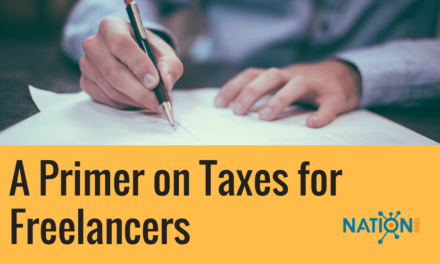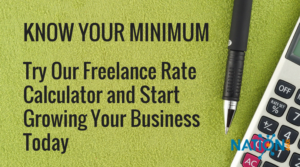Have you been day-dreaming about quitting your job and freelancing full-time? It’s a huge temptation for many of us and could be the right move.
However, you first need to consider some crucial factors before doubling down on your side-hustle. One of the greatest curiosities we have as consultants and aspiring independents is the big existential question: “when do I start freelancing full-time?”
It’s a timely concern — a recent study by Upwork and Freelancers Union found that nearly 54 million Americans as of 2015 call themselves freelancers and 50 percent of that total has no interest in ever returning to the 9-5 grind.
Related reading: Ultimate Guide to Gig Economy Data: A Summary of Every Freelance Study We Can Find
Freelancing full time can be very rewarding, but a successful “plunge into the deep end” requires a lot of planning and self-discipline. If you meet any of the qualifications below, it might be time to start your freelance career.
You have a “rainy day” fund
The conventional wisdom is that a freelancer, to make a go of it, needs between three and six months of savings to cover basic living expenses (rent, groceries, health insurance, gas, etc.).
You need to budget a realistic estimate of your cost of living and determine if you have the funds necessary to weather a dry spell or unexpected expenses.
This is not money you should plan to cut into immediately. Ideally, you want your freelance work to do that heavy lifting! This is strictly an emergency fund that makes it safe to take a financial risk.
Full-time blogger and business writer Gina Horkey is more conservative in her estimate to accommodate for the sometimes cruel whims of life as an independent contractor.
“As a freelancer, 6-12 months is more like it,” says Horkey. “Again, this is due to the unpredictability of pay and planning for the unexpected — i.e. what if a client is late in paying you?”
Related reading: Check out our interview with Gina!
You have a strong portfolio of work
This should come as no surprise — to start freelancing full-time you need a healthy body of work, either from your full-time job or a side hustle that conveys your unique capabilities to potential clients and this work needs to be accessible.
Take some time to refresh and clean up your social media profiles (particularly LinkedIn and any gig sites like Upwork). If you don’t have much experience in the field you aspire to work in, side hustles are a great way to test the waters and get to know your market better.
You have a network to draw from and work lined up
This goes hand-in-hand with the last point. Before leaving the agency I worked at a couple years ago, I made it a top priority to line up at least a couple clients and a number of professional contacts prior to my exit.
Some of these contacts didn’t amount to anything. Others I still work with to this day.
In one case a competitor even got me a gig. Do some legwork before you bail; you will be very glad you did.
In fact, one very reasonable strategy is to make your current employer your first client. Explain to your boss that you love certain parts of your job but not other parts. And that’s why you are going to build an independent career, so you need to give your notice. Then explain that you would love to keep working together in that mode.
Making your employer your first client can make for a good transition that benefits both of you. They retain your skills for certain key activities, and you have a foundation to start building up your freelance business.

You’ve experimented with a daily routine (and you were actually productive)
When freelancing full-time you need to hold yourself accountable for all of your working hours. You may have no problem doing this for your boss or project manager, but when your day is a blank canvas and no one is hovering over you, how do you fare?
We get into this subject in more depth in The Freelancer’s Guide to Time Management.
If you don’t have a good sense of your ability to manage your time, try blocking out a strict night or weekend part-time schedule for yourself. Commit to working a definite number of hours every Monday and Wednesday night or maybe Saturday and Sunday morning. Assess whether or not you are capable of being your own boss.
Because, as your friend and colleague Ed Gandia says, once you are freelancing “if you want to eat, you gotta hunt.” You don’t want to have find out when the rent is due that you don’t have the discipline to hustle for clients.
You have reached your “tipping point”
This does not mean you’re going to snap if your boss ask you for the TPS reports again. That’s a good reason to leave your job. It’s not necessarily a good reason to go to full-time freelancing.
What we’re talking about here is a financial “tipping point” where continuing your day job is actively cutting into good opportunities to get more freelance clients.
For instance, a career-advancing project comes up on the side for you and your current full-time job does not afford you the time necessary to do it. Perhaps multiple clients want to expand your role with them.
Maybe you even had to turn down new clients because of your 9-5!
Now you have a really strong signal that freelancing full time is possible.
Related reading: Two Signs Your Freelance Fees Are Too Low
Look before you leap into freelancing full-time. Then leap!
If you’re anything like me, you never truly feel ready. There’s an upside to this insecurity in the sense that you’re always driven to grow and prove yourself. However, fear should not hold you back from making an honest and well thought out venture into freelancing full-time.
As our colleague Jessie Kwak puts it, “The first goal is one client. Change that and change everything.” If you wait until you’re ready, you’ll never do it.

Ben Shanbrom is a freelance writer, musician and copy editor who works with artists and other clients around his native New Haven and well beyond.










